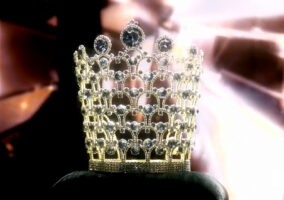 Phyllis Logan and Jim Carter in Downton Abbey, on PBS
Phyllis Logan and Jim Carter in Downton Abbey, on PBS
We think it’s fairly safe to say our experience of last night’s episode was quite a bit odder than yours. We realized last week that we’d be in the air flying home from our book signing at the Mall of America while the episode was airing, which meant that live-tweeting it was going to be impossible. But we couldn’t accept the idea of being left out of the conversation while the Downton Abbey finale aired (especially since we’d seen it already, loved it, and knew people would be talking about it) so we got out our screener of the episode last Thursday, popped it in at exactly 9 pm, and composed several hundred tweets in real time, noting the time on each one. On the plane last night, we opened up the document and spent the entire 90 minutes cutting and pasting tweets, without actually watching the show while doing so. It was oddly technical, all the emotion or joking having taken place days before, to an audience of no one. Pre-recorded live-tweeting. Weird.
Anyway, that doesn’t matter, because the first time we watched this episode – and every time since – we were grinning from ear to ear. It couldn’t have been any lighter a confection; a perfectly pleasant hour-and-half composed of tiaras and feather fans and balls with royal attendees. Ninety minutes that were so light-hearted, they all but ended with Mary smiling and shrugging and saying, “Heavens, that murderous valet is terribly loyal. Who am I to judge his indiscretions?” A moment that pretty much tops all the other ahistorical and unlikely “aristocrats being ridiculously lenient with their servants” in the history of this show – and there are a TON of them.
But we don’t watch Downton Abbey for historical accuracy. Any show that has a Yorkshire cook in 1924 utter the line “I suspect we want different things” in order to give a guy (WHO IS ALSO THE MOST ANNOYING STEREOTYPE OF THE BUMFUCKE AMERICAN sorry) the brushoff is not putting such concerns at the very top of their to-do list. No, we watch Downton Abbey because it’s a high-gloss historical melodrama and this season saw Julian Fellowes wholeheartedly embrace that fact, by constructing it top to bottom with the most cliched soap opera tropes you could come up with: rape, scandalous pregnancy, doomed-by-the-times-they-live-in relationship, murder, a grieving beautiful widow and mother with a “desire of suitors,” a grieving, handsome widower and father, fighting off the predatory advances of women who don’t deserve him – it was all there. We kept waiting for it to cut to a laundry detergent commercial.
And believe it or not, that is not a dig; not even a little bit. We’ve said this before about this season, but there’s value in a thing knowing what it is and playing to its strengths. Maybe the audience wants more out of the show than that, but after the dreary “mutilated soldiers and one family death after another” period of the show, we think it needed to course correct. And in a way, it course-corrected right back to its first season, when the youngest daughter was running off and doing scandalous things, the middle daughter was being ignored by her family to a shocking degree, and the oldest daughter found herself embroiled in a farcical sex scandal while simultaneously fighting off the advances of, well … a different desire of suitors. Apparently, half the male aristocracy in England has been putting off marriage for the last decade in the hopes they’d get a shot at Lady Mary Crawley. We’re starting to wonder if Evelyn Napier drove the truck that ran Matthew off the road.
Oh, damn. No one tell Julian Fellowes we said that last bit, you guys. We can’t give him any ideas.
Our point is, to those who say the show got too soap opera this season, we say it’s just returning to its roots. And we’d rather see frothy melodrama from this crowd than serious attempts at historical drama, because Fellowes simply isn’t up to it or interested in it. We enjoyed pretty much every bit of it, even when it got absurd.
This isn’t to say we don’t have criticisms, though. Tom Branson’s story was annoyingly repetitive. The re-introduction of Edna Braithwaite made him look weak and stupid, while the followup Miss Bunting has turned out to be pushy and obnoxious, if not downright rude. We’re not sure what the point is supposed to be except that, Sybil notwithstanding, he seems to have horrible taste in women.
Also, Anna’s rape turned out to be All About Bates, a character who seems to fascinate Julian Fellowes and almost no one else. We can’t imagine the story of his committed murder is closed, but we also can’t imagine he’d be so foolish as to write another Bates-on-trial storyline. Then again, O’Brien managed to never have to pay for or admit to her soap shenanigans, so maybe the matter really is closed. Either way, it didn’t fascinate us as much as we suspect Fellowes intended, given how much time he spent on it. And it’s a bit disturbing how little Anna’s rape had to do with Anna in the story.
On the other hand, we couldn’t help but laugh at the Criminal-on-Tap position he holds in the Crawley household now, forging letters and picking pockets, all on behalf of the family’s good name. It’s silly, but we could see how such a development could be fun if its deployed lightly and infrequently. The little Scooby Gang escapade to save the British monarchy from another scandal was surprisingly fun to our eyes, capping off the episode with an out-of-left-field, but nonetheless very satisfying, fairy tale ending, as Cousin Rose (who, we don’t care what anyone says, has turned out to be a better character than anyone could have expected) got to dance at her coming out ball with a real live prince and heir to the throne. It doesn’t get much glossier than that.
But then there’s the whole thing Fellowes has about elevating and whitewashing the aristocracy, to the detriment of any Americans or working class people portrayed in the story, from the original Beverly Hillbillies, The Levinson family, to their clearly brain damaged valet, and even to the obnoxious Miss Bunting and weak-willed Tom, not to mention the sociopathic Barrow. “These are your people now,” Violet says to Tom at the ball, and even we have to groan and roll our eyes at that one. Forget historical accuracy; that strikes us inaccurate for the character as she’s been written up till now. She may be a kinder woman than she was a decade ago, but she’s no less imperious or in love with the class system which has shaped her whole life. Granted, he occasionally gives us a chance to see the seedier side of the British upper classes, with con men and card sharks populating the background (and in this episode, partially driving the main story), but most of the time, if there’s a crime or morally bad act being committed on this show, it’s being committed by someone much lower on the class or social scale than the beloved Crawley family, who are strangely interested in the lives of their servants.
But at this stage of the game with this show, you pretty much know these things already. They’re worth pointing out in order to put the show in perspective, but it’s not going to change. This is Fellowes’ baby and this is how he thinks.
Still, we get lovely scenes of Mrs. Hughes and Mr. Carson, gingerly wading into the ocean, holding on to each other, and almost literally testing the waters on the idea of something more than an intense working relationship. Part of us loved the idea of them having a non-romantic, non-sexual marriage in all but name. We felt it was unique and an interesting way to highlight the kinds of working relationships that occur in the community under the stairs. But a show has to move forward and as it advances into late middle age (we’re guessing) what was subtext now has to become text in order for it to feel like it’s progressing. We know that final scene made a whole lot of Carson/Hughes shippers thrilled.
As for Lady Mary, we love watching her gowns and dropping bitchy bon mots into a scene, but we’re really not all that interested in her love prospects at the moment. It feels like supremely well-tread ground and to be perfectly honest, nothing about any of her potential suitors strike us as all that distinct from each other or from Matthew, to be honest. They should bring Richard Carlisle back. He was an asshole, but they had real fire together. These pouty-lipped aristos are boring as hell.
And finally, Lady Edith really doesn’t give a fuck what anyone thinks anymore, she’s taking control of her own goddamn life, right under the noses of the assholes who ignore her so much. Is this a semi-happy ending for her and her baby, now being raised in secret by the hottest little farmer in Yorkshire? We don’t know, but it’s a story turn rich with possibilities. Now more than ever we think that if Fellowes ever gets tired of the current show and wants to either re-energize it or turn it over to someone else, they should skip ahead to World War II and show us the lives of George Crawley, Sybbie Branson, and Whatever-her-name-is; three cousins, wildly apart on the class scale, living in the same tiny English village during the War. How cool would that be?
But we’re fine with sticking to the “here and now” of the mid-1920s. There’s still story to be told, after all. In the end, we are going to want to know who Mary marries and if Edith finds permanent love in her life (or whether she’ll have to console herself by being a fucking fabulous London newspaper editor), and what’s going to happen next with the surprisingly tender Molesley/Baxter pairing, and the Carson/Hughes one, for that matter. We’re going to want to know if Tom ever snaps the hell out of being pushed around by others and whether Isobel is going to realize a good thing when it lands her lap. For all its frothiness, Fellowes managed to lay the groundwork for a ton of story possibilities down the road. That’s probably the show’s greatest strength. There’s still much to tell about the characters after all this time.
[Photo Credit: Nick Briggs/Carnival Film & Television Limited 2013 for MASTERPIECE]
Sarah Hyland Style Double Shot Next Post:
The Walking Dead: Claimed
Please review our Community Guidelines before posting a comment. Thank you!



